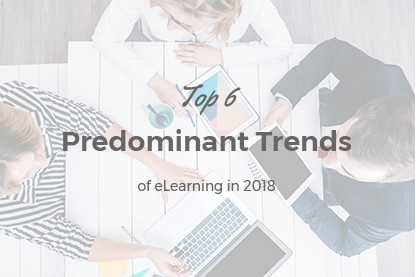Today we are delighted to welcome to the JoomLMS blog an eLearning expert, author of E-Learning Provocateur blog and a former ELearning magazine editorial board member - Ryan Tracey.
The funny thing is that when we discussed an interview topic with Ryan, he chose “Advanced technologies needed to foster online learning within the organization” because he had an opposite opinion on the topic. Provocative, right?
Let’s check what Ryan had in mind…
Today we are delighted to welcome to the JoomLMS blog an eLearning expert, author of E-Learning Provocateur blog and a former ELearning magazine editorial board member - Ryan Tracey.
The funny thing is that when we discussed with Ryan an interview topic, Ryan chose “Advanced technologies needed to foster online learning within the organization” because he had an opposite opinion on the topic. Provocative, right?
Let’s check what Ryan had in mind…
I do indeed believe that technology enhances learning, but I caution against the use of technology for its own sake. It's very tempting when a shiny new toy is released to promote it as the panacea for all our ills, but the truth is that any technology will be useful under some circumstances and useless under many others.
So instead of starting with a technology and trying to find a problem for it to fix, I suggest starting with the problem and consider the spectrum of technologies that might help solve it. This involves thinking more critically about the pedagogy -- are we trying to facilitate collaboration? empower on-demand learning? enable just-in-time learning out in the field? Once we're clear on the business need and the pedagogy to address it, the questions of whether technology can support us and which ones to choose become easier to answer.
Technology that is commonly used outside the workplace has a strong chance of being accepted inside the workplace because its benefits don't need to be "sold" to the target audience; they're already hooked.
An obvious example is the smartphone: when we're at home or out somewhere, it's natural for us to refer to the public transport app to find out when the next train arrives, or to look up something on Google. So it makes sense to leverage this device with which our people are already familiar, and help them to do their jobs with it.
I think the greatest challenges involving change at any organisation are cultural rather than technological. Despite the technology being wonderful, it won't be adopted if the people in the organisation are resistant to using it.
In such a situation, one way to overcome the problem is to start small: rather than taking a "big bang" approach that accentuates the contrast between the old way and the new way, implement smaller changes over time; this approach allows the target audience to become comfortable with the changes as they go along, without feeling overwhelmed.
Regardless, a critical factor for overcoming cultural barriers to change is executive support. Managers set the norm for the people who report to them, so it's important they demonstrate the new norm by leading by example. When managers embrace the change, everyone else will too lest they are left behind.
If a particular technology has been identified as a potential solution to a business need and it matches the pedagogical approach, there are still other factors to consider. For example, is it easy to deploy? If it's too expensive, incompatible with the company's SOE, or a logistical nightmare, then it won't solve much. Once deployed, is it easy to operate? If you need a PhD to use it, no one will. Looking further ahead, who's going to manage it and maintain it? If that isn't determined up front, it will eventually fall in a heap.
I think the LMS is an important component of the organisation's formal L&D strategy. For "must know" subject matter, the LMS centralises, distributes, assesses, records, and reports the necessary training. Having said that, the LMS can also play a role in facilitating informal learning. Assuming the system is easily accessible and navigable, then it may make sense to use it to host on-demand content and social media that the employees can access at their convenience as the need arises.
Training programs are the "10" in 70:20:10, and that's typically where they remain in isolation of everything else. To get the most out of them, they should be complemented by other activities and interventions drawn from the "70" and the "20" to provide a more holistic intervention. Ignoring these other dimensions means you won't be offering job aids, on-the-job experience, peer-to-peer collaboration, expert guidance, or manager support. Instead, you'll cross your fingers and hope the trainee will remember everything in the course and seamlessly transfer that knowledge to the job at hand. It would be laughable if it weren't so serious.
About the Author:

Ryan Tracey is the author of the E-learning Provocateur blog, a former ELearning magazine editorial board member and an eLearning Manager in the Australian financial services industry.
He has over 14 years of experience in the eLearning field and focuses on adult learning, informal learning and social media.
To learn more about Ryan, visit him on his web site: ryan2point0.wordpress.com or follow him on Twitter @ryantracey
What to read next?
How to Motivate Students Online
How to Overcome Information Overload
The Secret of Building Professional Learning Communities









